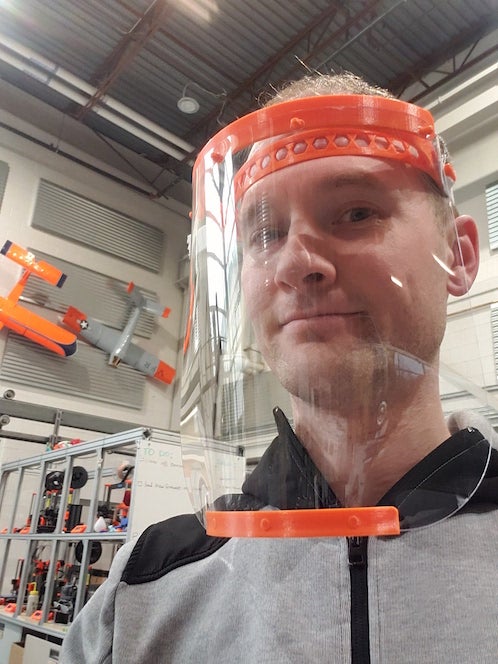
It didn’t take long in the midst of the COVID-19 crisis before Amy Vecchione started hearing from students, staff and faculty who wanted to help the community. She heard from those who own 3D printers who were willing to share their equipment and expertise to create much-needed medical equipment.
Vecchione, an associate professor and head of Emerging Technologies and Experiential Learning at Albertsons Library, oversees the MakerLab. She has been managing this effort in coordination with the College of Engineering and at the behest of Boise State President Marlene Tromp. The project involved evaluating and vetting scores of open source models being shared on the web for full ventilators, simple masks and “everything in between,” said Vecchione.
The group has printed hundreds of face shields so far, and will continue production, said Vecchione. She already is fielding requests from organizations that want to buy equipment from Boise State. The Boise State kit includes a 3D printed headband and a laser-cut clear plastic visor that goes over the face.
In addition to Boise State’s volunteer 3D printing team – around 17 students and 20 staff and faculty members who are working from home, as well as in the MakerLab and the Engineering Innovation Studio – local organizations are supporting the effort. They include the Meridian Library District, other libraries in Southwest Idaho, and local companies Black Box VR and Shook Ideas. Jock Farra from 3D Precision in Garden City (the firm that supplies plastic filament to the MakerLab) has donated enough filament to print more than 1,000 headbands. Dick Sevier from the university’s C-TAP (Technical Engineering Program) and Griff Allen, Engineering Innovation Studio manager, printed the first prototypes.
Micron has also joined the project. Members of the company’s Additive Manufacturing Club have been printing headbands at home in their spare time on their personal 3D printers, said Ron Steele, design and drafting engineer.
“We will continue to make these as long as there is a need,” said Steele.
Micron has also requested that company 3D printers in Micron’s Design & Draft department use any available machine time to help produce the headbands for Boise State.
The project has been unusually rewarding, said Griff Allen.
“It started with the idea that we could help the medical industry out by creating items they can’t buy right now. It’s a big group effort. This project embodies the spirit of Boise State,” he said.
Some hospitals are reimbursing Boise State for the cost of the clear plastic used in the face shields. In other cases, Boise State is working with libraries to have parts donated by the maker community. One example is an organization in Nampa that needs 25 shields. Boise State is working with the Meridian Library District and a volunteer maker to coordinate the donation of needed parts.
“We are going to do what we can at Boise State to support civility, happiness and connection among the people in our community,” said Vechione.
To join, or donate to this grassoots effort: https://give.boisestate.edu/student-innovation
– Story by Anna Webb